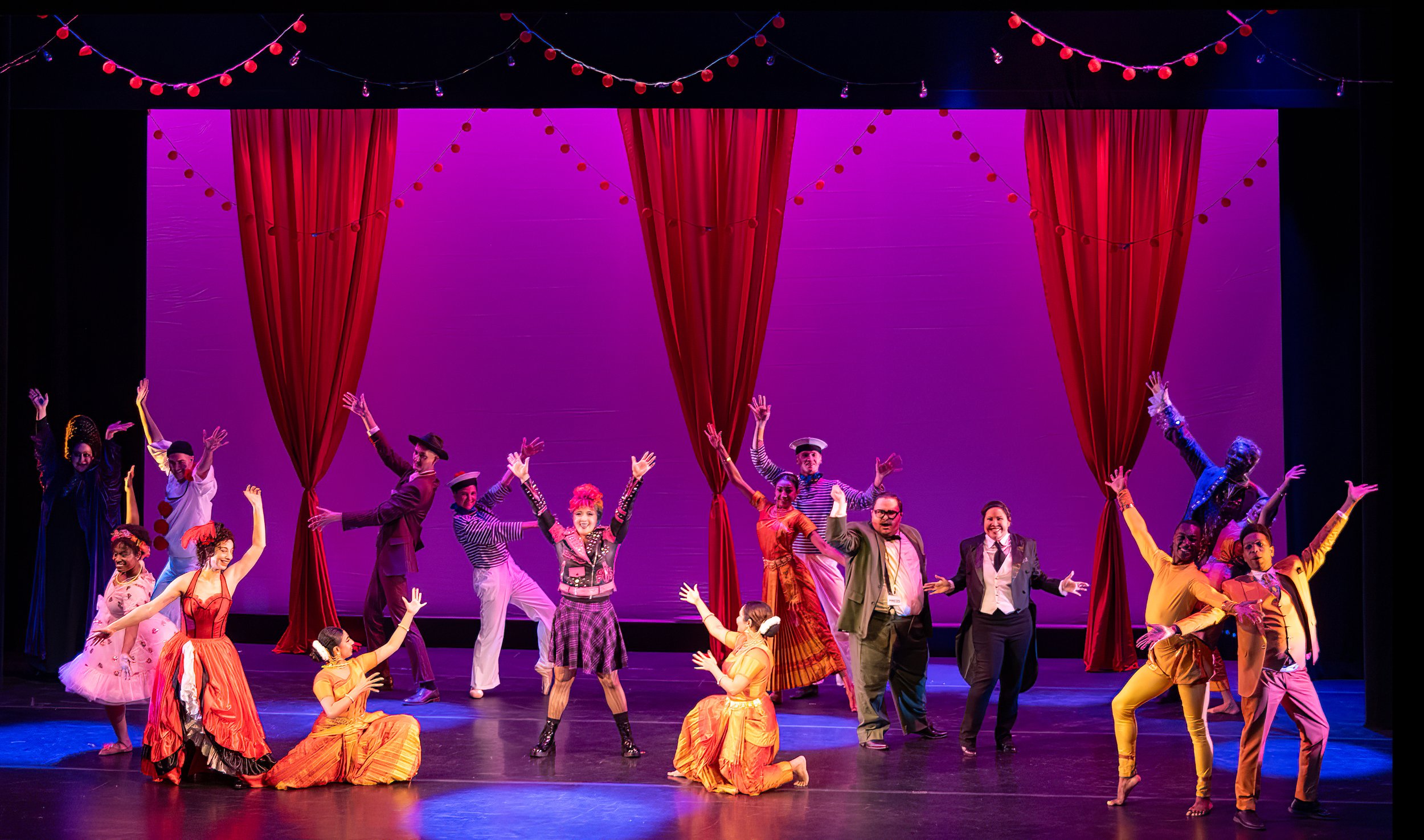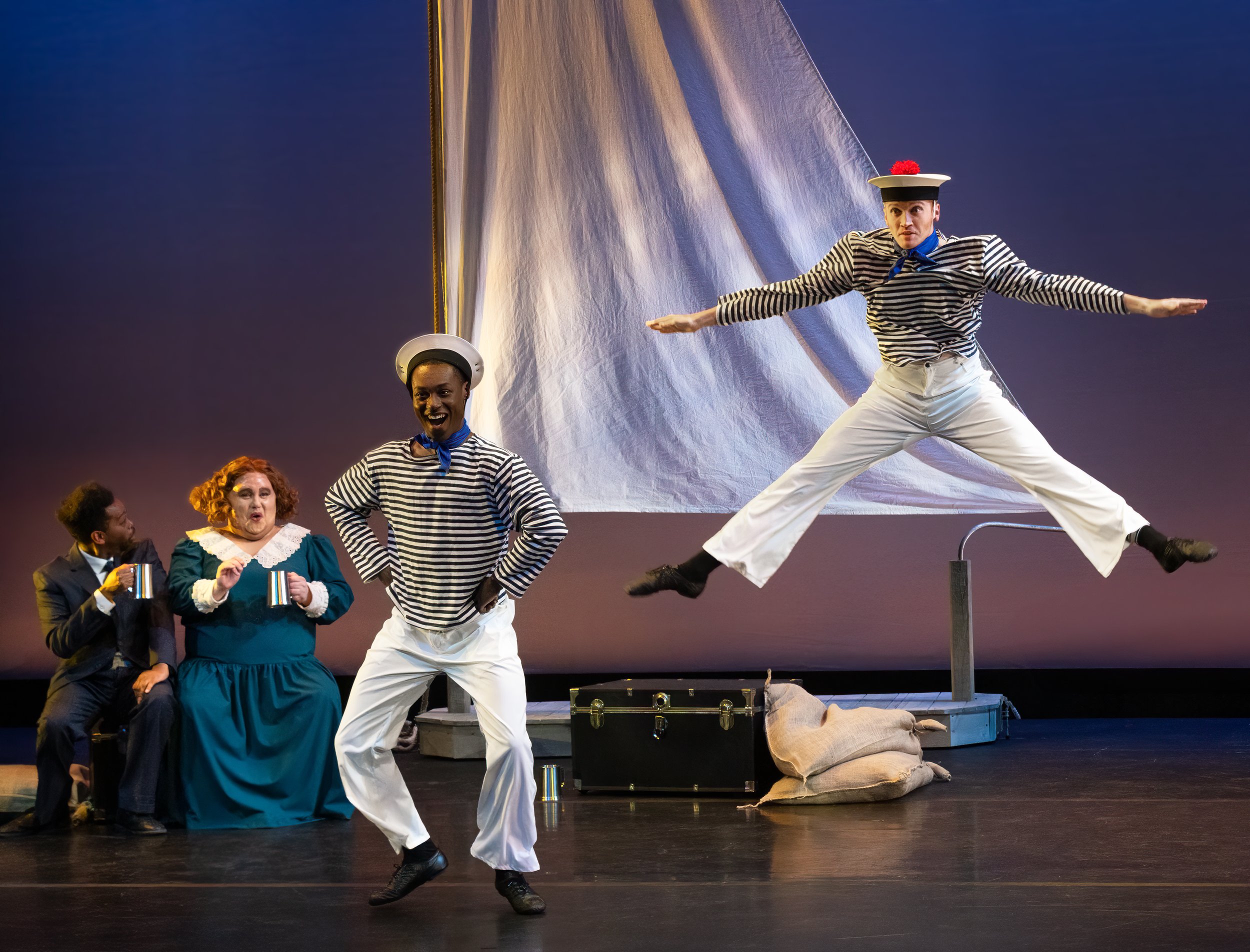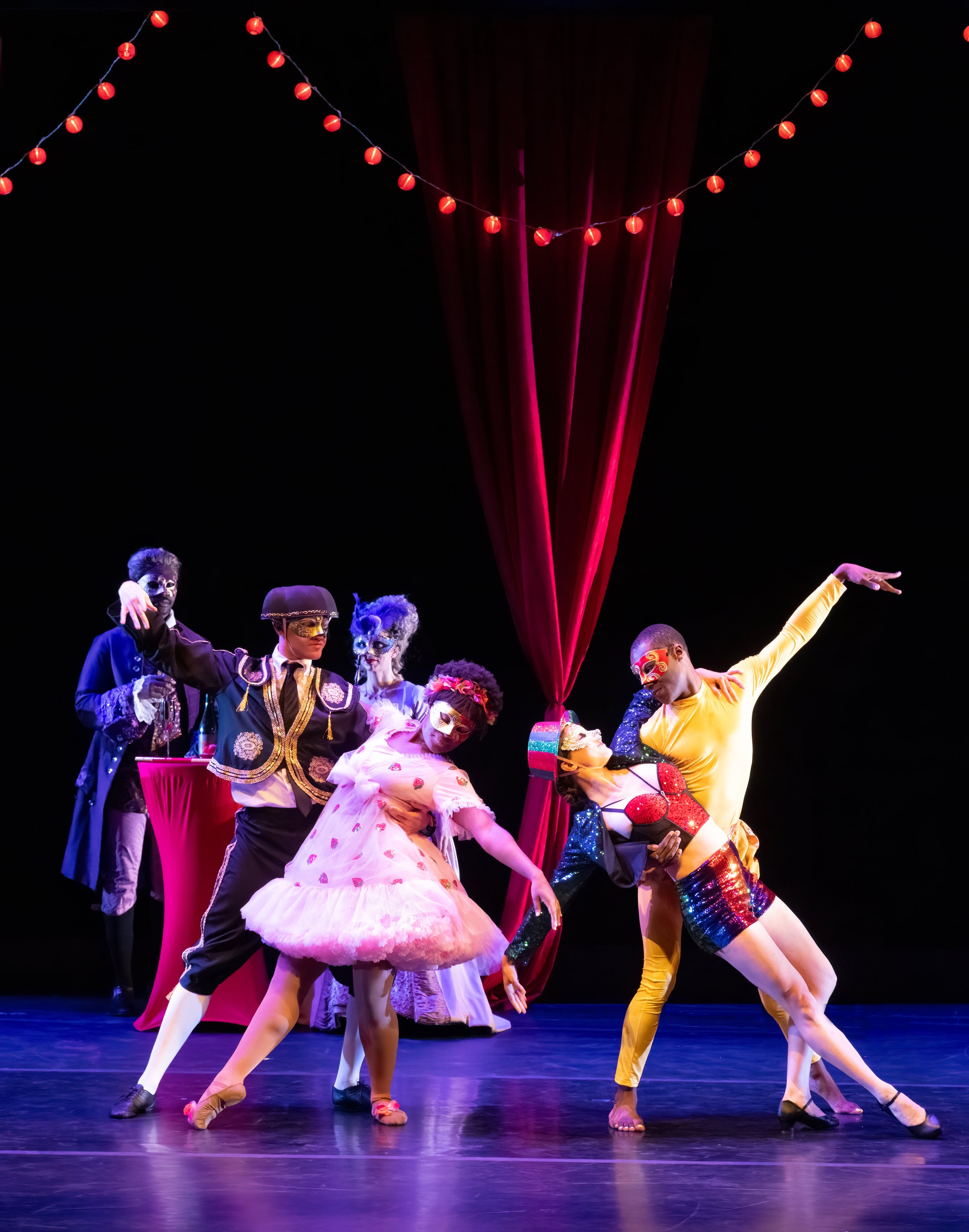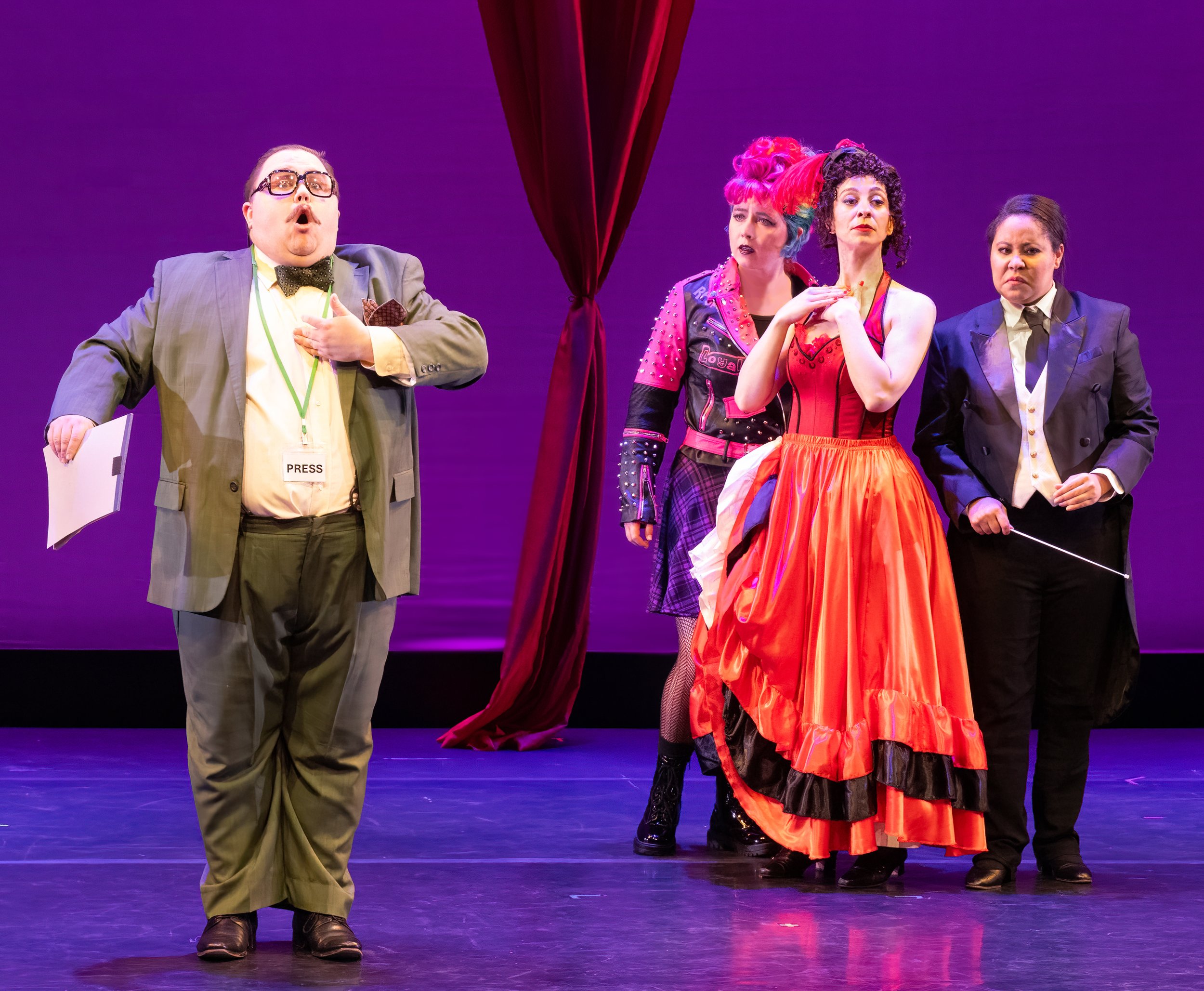Opera Lafayette is an 18th century French opera company in present day, combining elements of the Paris Opera and the Opera Comique, often Americanized in presentation but always authentic in its approach to the music. OL serves two metropolitan areas – Washington DC and New York City, while maintaining strong connections to performers and musicologists in France, even having performed at Versailles. They are in the process this month of concluding their 2023-2024 season with their final production in DC and a festival including two of three productions from this season plus a gala in NYC. Thus, with Mouret’s Les Fêtes de Thalie, they bring to an end a season whose theme has been the influence of Madame de Maintenon, the second wife of Louis XIV, on French music. It also concludes three consecutive seasons of exploring the roles of famous French women in influencing French music; Madame de Pompadour and Marie Antionette were themes in the previous two years. I’ve about run out of superlatives to use for a company that so consistently provides delightful and culturally enriching programs not often performed today or heard elsewhere, and Fêtes is no exception. OL’s Les Fête de Thalie was a modern premiere of the work, not performed for the last 250 years according to Ryan Brown, the Founder and Artistic Director of Opera Lafayette.
Cast ensemble at ending of Les Fêtes de Thalie. Photo by Jennifer Packard Photography; courtesy of Opera Lafayette.
Frankly, Madame de Maintenon was a bit of a buzz kill and Fêtes was a counter reaction to that dampening. Her influence on the king gave her influence over presentations at court. She also had strong influence on the education of young women. More detail can be found in OperaGene’s reports on OL’s two previous productions this season, Couperin le Grand and From Saint-Cyr to Cannons: Moreau and Handel’s Ester. While she possessed fine qualities of high moral purpose, Madame de Maintenon persuaded a previously fun-loving king later in life to limit and largely restrict music and theater performances at Versailles to productions consistent with her views on morality, lacking sexual innuendo. The music scene in Paris became more progressive and increasingly influenced by Italian composers and artists, becoming more distanced from the Royal Court. In the opera-ballet, Les Fêtes de Thalie (1714), composer Jean-Joseph Mouret and librettist Joseph de La Font championed comedy in opera and introduced the audience to real life characters they could see as themselves rather than royalty and gods, the primary characters in previous French operas. Mouret’s opera-ballet also strayed from the five-act continuous story plotline to a prologue and three scenes related only by theme, later revised to include an ending Critique scene in response to criticisms of the work’s progressive aspects. Mouret’s opera-ballet enjoyed great success for the next fifty years. While it did not completely change the Paris opera scene, it did have an impact due to that success.
Apollo (Jonathan Woody) tries to reason with Melpoméne (Angel Azzarra) on his right and Thalie (Paulina Francisco) on his left. Photo by Jennifer Packard Photography; courtesy of Opera Lafayette.
Composer Mouret is not well known today although one piece of his music is; he wrote the opening theme used by PBS’ series Masterpiece Theater, a rondeau from his Suite de Symphonies heard by millions worldwide. He wrote a few other operas that achieved a measure of success and some that did not, none performed today. He was very successful as a composer of music for salons and the theater. His music and vocals are very tuneful and lively, some with pathos, very pleasing to the ear and quite representative of French baroque music, primarily featuring strings with flavorings from flute/recorder, woodwinds, and light percussion, and harpsichord for vocals and recitative. The most attention-grabbing music in Fêtes to me was in the third vignette, a bit more demonstrative and colorful. This version of the opera-ballet was created by harpsichordist Korneel Bernolet. The 23-member Opera Lafayette Orchestra in the pit directed by renown conductor Christophe Rousset played Mouret’s music expertly and beautifully accompanying singers and dancers, making for an enjoyable, highly pleasing evening. The Terrace Theater pit was quite deep and Mr. Rousset jumped up and down a few times to be seen and start the comedy. Mr. Rousset also conducted and played harpsichord in OL’s Couperin le Grand.
Captain Acaste (Jean-Bernard Cerin) receives entreaty from mother Belise (Patrick Kilbride). Photo by Jennifer Packard Photography; courtesy of Opera Lafayette.
This was Opera Lafayette’s most ambitious project of the season, taking some 5-6 years in conception, study, and delivery, according to Mr. Brown. Fêtes tells three different stories of love and women in different stages of life (the Girl, the Coquettish Widow, and the Wife), in addition to a Prologue to explain the premise and an ending Critique to settle an operatic argument. Nine singers are employed, most singing multiple roles and performing excellently as members of the chorus when off stage. In addition, featured were eight dancers, including five choreographers, from two different dance companies, with each scene including a different style of dance. Many singers also added some dance moves. Director Catherine Turocy did a marvelous job staging the action, moving so many players around the modest size stage of the Kennedy Center’s Terrace Theater, and enhancing comic elements that were not so subtle. The set was limited to a few props (Deborah Thomas) and lighting effects (Christopher Brusberg) which sufficed with so much going on to capture our attention. Each scene was a different setting (Jeffery Martin) and required different costumes (Marie Anne Chiment), covering a large swath of eras from the Greek muses to a modern-dressed emissary from Apollo laying down the law. The subtitles in English shown overhead with some absenteeism, especially for a segment when the Widow was presumably explaining her feelings.
A seated father Cléon (Jonathan Woody) and mother Belise (Patrick Kilbride) watch sailor dancers perform. Photo by Jennifer Packard Photography; courtesy of Opera Lafayette.
(spoilers occur in the remainder of the report) The Prologue features an argument between the muses of tragedy, Melpomène, and comedy, Thalie, over which should control the opera stage. Appearing first in a shimmering royal purple robe and commanding the stage briefly alone was soprano Angel Azzarra whose powerful, dramatic voice explained the seriousness of the situation. This quickly turned seriously funny as soprano Paulina Francisco with a lighter, more lyrical sound and dressed in punk rock, sassy attire appeared to claim the comedies’ turn, stating that people weary of crying while no one tires of laughing. Apollo, the Greek god of music, exasperated and compromising, is forced to appear to settle the issue. Handsomely played and sung by OL regular, bass-baritone Jonathan Woody dressed in a suit, rules tragedies will be performed in the winter and comedies in the summer, apparently a real trend in operas of the day. Singers and dancers appeared on the stage for a rousing, comical finale to the scene.
Suitor Léandre (Scott Brunscheen) and Doris (Angel Azzerra) observe suitor Chrisogon state his case, while Isabel (Pascale Beaudin) listens, hiding in the back. Photo by Jennifer Packard Photography; courtesy of Opera Lafayette.
La fille (The Girl): the first of the three theme-linked stories takes place in a harbor where a father, Cléon played by Mr. Woody, arrived after an extended absence to reclaim his wife and family, having been extracted from capture by Captain Acaste. Acaste was well played and sung by tenor Jean-Bernard Cerin who is also the suitor for his daughter, Léonore. She is more modestly sung and played with hesitation to marry by Ms. Francisco. OL veteran, tenor Patrick Kilbride in a skirt role appeared as Belise, the mother who is unware her husband is back and has a yearning for Acaste herself. Acaste plays to her desire to make Léonore jealous. Mr. Kilbride’s mother portrayal is sung and played beautifully, funny and convincing; he steals the scene. Additional singers (John Taylor Ward and Ariana Wehr) and dancers (Julian Donahue, Patrick Pride, and Julia Bengtsson) as sailors joined in an entertaining closing to the scene. Mr. Ward’s aria, an affirmation of marital love, was warm and touching.
Widow Isabel (Pascale Beaudin) joins in with party dancers. Photo by Jennifer Packard Photography; courtesy of Opera Lafayette.
La Vueve Coquette (the Coquettish Widow): In a country scene, Isabel, sung with a lovely tone and played with coquettishness by soprano Pascale Beaudin, sings that there are some advantages of widowhood, a thematic bookend to Léonore’s citing the advantages of not getting married in the first place. Her friend Doris, ably played and sung by Angel Azzarra, pleads with her to pick one of her two suitors to marry. The two suitors arrive to plead their case, Léandre, a military man played by tenor Scott Brunscheen, and Chrisogon, a rich businessman, played by bass-baritone John Taylor Ward. Both sang beautifully, Mr. Bruhscheen with military resolve and Mr. Ward with a financier’s swagger. Chrisogon has ordered up an entertainment, a village wedding party, to win Isabel’s favor. Soprano Ariana Wehr sang compellingly, extolling the virtues of marriage and Pragnya Thamire provided a lovely bride, while dancers Mytreyi Nair, Deviga Valiyil, Julian Donahue, and Siri Tanjore made it a party. A moment of potential sadness occurred at the end as Isabel chose neither suitor but was quickly turned to laughter as both singers sang that life with one less mistress wasn’t so bad.
Spouses Caliste (Pascale Beaudin) and Dorante (Jean-Bernard Cerin) with masks and emotional distance removed. Photo by Jennifer Packard Photography; courtesy of Opera Lafayette.
La Femme (the Wife): In a costume party ballroom scene that would fit well at the Venetian Carnivale, Caliste, played and sung with resolve by Pascale Beaudin ponders her husband Dorante’s sexual adventure with a woman who he has fallen for but who had not revealed her face as yet, with a theme of how to keep love current in a long term relatiohship. The husband, played and sung with fickleness by Jean-Bernard Cerin pleads with the object of his desire to remove her mask. Meanwhile, Caliste’s friend Dorine, played and sung with brightness and charm by Ariana Wehr, her standout role of the opera-ballet, worries her husband Zerbin might be doing the same thing, though Zerbin played and sung with party-reluctance as a wing man for Dorante by Scott Brunscheen remains faithful to Dorine. Dorante incriminates himself time and again, but when the potentially murderous moment of mask removal arrives to reveal the woman was Caliste, Dorante declares this proves Caliste is the only one he loves and Caliste accepts him back willingly. We were treated to dancers (Julian Donahue, Patrick Pride, Julia Bengtsson, and Adele Lorraine) performing during most of the entire scene.
Costume party dancers perform. Photo by Jennifer Packard Photography; courtesy of Opera Lafayette.
In the ending Critique, Polyhymnia, the Muse of Music, played and sung by Ariana Wehr, appears to credit the opera-ballet’s success to its music while Thalie (Paulina Francisco) reappears to give the credit to her libretto, making snippy remarks to each other. They are joined by Terpsichore, the Muse of Dance, played and sung by Pascale Beaudin to give all the credit to the dancing. Each singer delights but it is the arrival of Apollo’s emissary Momus, the god of mockery, who settles the argument: all added value to the opera-ballet.
Terpsichore has reminded me to add another word about the inclusion of dance. I am happy to because I am always happy to see dance included in opera productions. There were four dancers each from two opera companies that OL has worked with before: Kalinidhi Dance, with dances choreographed by Anuradha Nehru and Pragnya Thamire, and the New York Baroque Dance Company, with dances choreographed by Julia Bengtsson, Julian Donahue, and Caroline Copeland. I most enjoyed the dances in the widow and wife scenes. The Indian dance moves with clapping and foot stamping by the Kalinidhi dancers in the widow scene were a treasure, and the fancy and elegant moves at the costume party by the baroque dancers were thrilling.
Momus (Patrick Kilbride) reaches judgment on the cases made by Thalie (Paulina Francisco), Terpsichore (Pascale Beaudin), and Polyhymnia (Ariana Wehr). Photo by Jennifer Packard Photography; courtesy of Opera Lafayette.
It's easy to understand why Les Fêtes de Thalie was huge success in its day, liberating to some degree a repressed society from strict entertainment rules, reminiscent I think of arrival of rock and roll in the America of the 1950s, i.e. the Ed Sullivan variety show on TV would not show Elvis below the waist, his gyrations offending many of the older set. I also agree with Momus that each element of opera-ballet, the music and singing, the story and poetry, and dance are gifts to its audience. It is also easy to see how such a work as Fêtes could be successful today in a time when we can sorely use some entertainments without sadness, especially if delivered with the extensive investigation, authenticity, the high quality of performers, charm, and delight of Opera Lafayette productions. Once again, OL has brought forward a mostly forgotten, but still worthy, work within a framework fully accessible to modern audiences. Bravo!
The Fan Experience: Opera Lafayette scheduled performances for Les Fêtes de Thalie on May 3 and 4 in the Terrace Theater of the Kennedy Center. The performance was about 2.5 hours including one intermission. The opera-ballet was performed in French with English subtitles shown overhead. Soprano Margot Rood was originally part of the cast but had to withdraw due to health reasons; her roles were sung by Paulina Francisco.
Opera Lafayette is offering a printed program book for the season of Madame de Maintenon for a $5 charge; it includes expert essays for each of this season’s productions. An online version is available for free at this link. The pre-opera talk hosted by Ryan Brown and featuring a talk by music historian Professor Rebecca Harris-Warrick took place one hour before the performance. She worked with Opera Lafayette in planning this work and has a feature article in the program book. I searched in vain for a recording of the opera-ballet.
An OL fund raising gala is planned for May 7 in NYC and performances in NYC were scheduled for:
October 26, 2023, Couperin Le Grand at the Kosciuszko Foundation
May 7, 2024, Les Fêtes de Thalie at Museo del Barrio
May 9, 2024, From Saint-Cyr to Cannons: Moreau and Handel’s Ester in St. Peter’s Church









